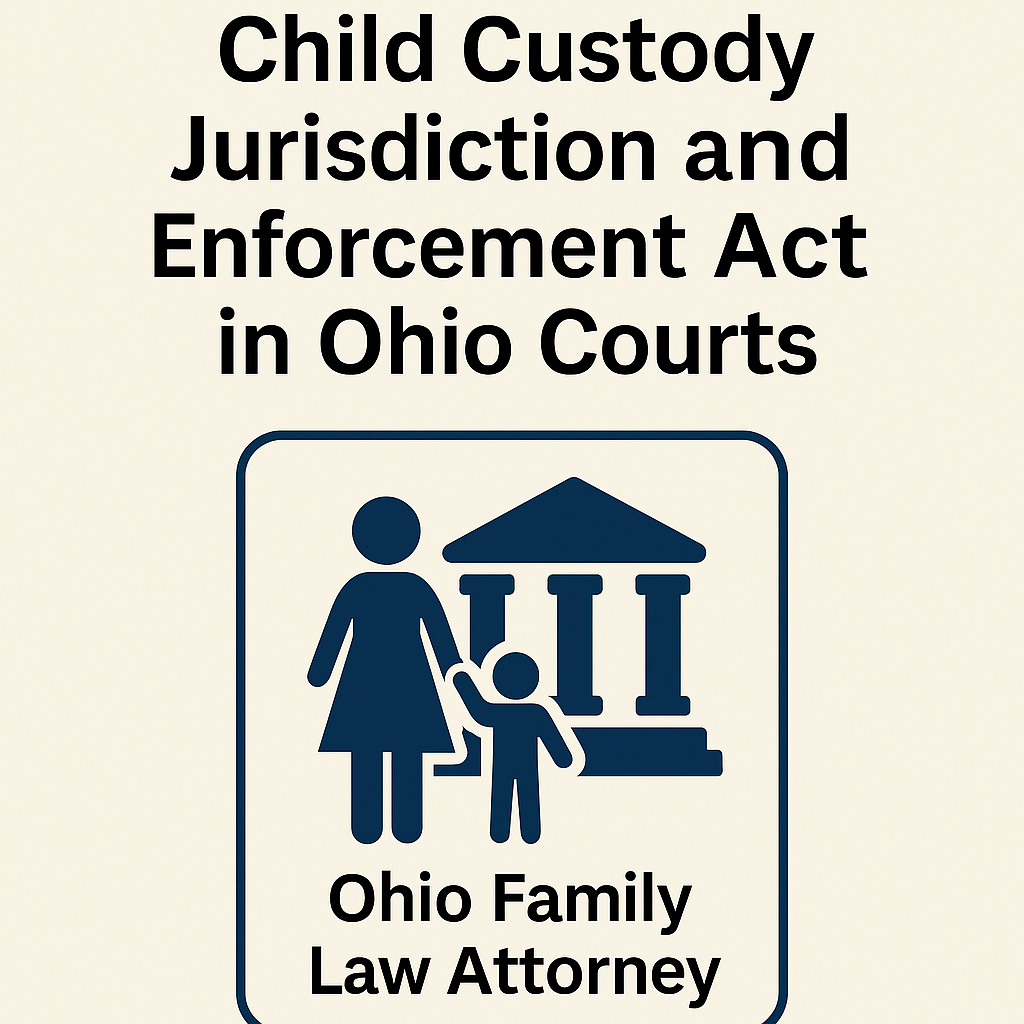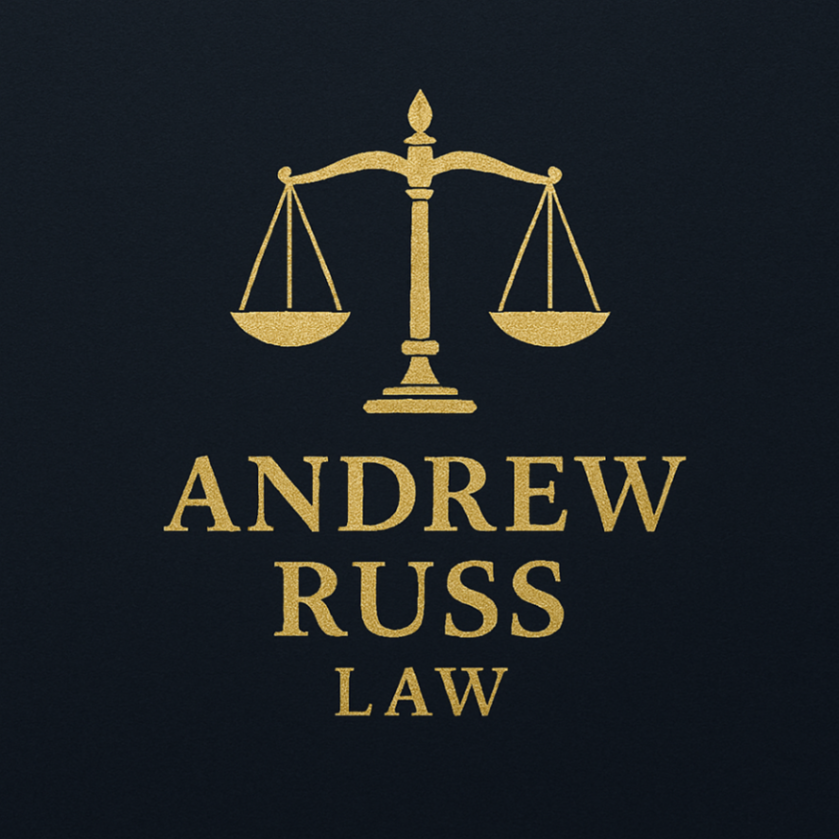Uniform Child Custody Jurisdiction and Enforcement Act in Ohio By Andrew Russ Law
- Aug 6, 2025
- 6 min read
Updated: Aug 10, 2025

Attorney Andrew Russ Ohio family law andrewrusslaw.com
Learn how Ohio courts apply the Uniform Child Custody Jurisdiction and Enforcement Act (UCCJEA). Discover how an experienced Ohio family law attorney can help in multistate custody cases
Introduction
When child custody disputes cross state lines, jurisdiction becomes one of the most critical legal issues. To avoid conflicting orders and forum shopping, states across the U.S. adopted the Uniform Child Custody Jurisdiction and Enforcement Act (UCCJEA). In Ohio, the UCCJEA has been fully enacted and governs how courts determine jurisdiction in child custody cases involving more than one state.
For parents navigating custody challenges involving multiple jurisdictions, understanding how Ohio courts apply the UCCJEA is essential. This article—written with insights from an experienced Ohio family law attorney—breaks down the UCCJEA’s core provisions, enforcement procedures, and implications for families throughout the Buckeye State.
What Is the UCCJEA?
The Uniform Child Custody Jurisdiction and Enforcement Act is a model law created by the National Conference of Commissioners on Uniform State Laws. Its purpose is to:
Establish consistent jurisdictional rules for child custody matters,
Avoid custody conflicts between states,
Prevent parental kidnapping,
Ensure custody orders are enforced across state lines.
Ohio codified the UCCJEA in 2004 under Ohio Revised Code Sections 3127.01 to 3127.53, and every U.S. state except Massachusetts has adopted the Act.

Why Jurisdiction Matters in Child Custody Cases
Jurisdiction refers to a court's legal authority to hear and decide a case. In custody disputes, if more than one state is involved—such as when a child moves or a parent relocates—multiple states might claim jurisdiction. This is where the UCCJEA steps in.
Ohio courts follow the UCCJEA to determine:
Which state has initial jurisdiction,
Whether a state must defer to another,
When a state can modify an existing custody order, and
How to enforce orders from other jurisdictions.
Without consistent jurisdictional rules, parents could move children from state to state seeking favorable custody rulings, leading to conflicting orders and prolonged litigation.
Four Types of Jurisdiction Under the UCCJEA
The UCCJEA defines four distinct jurisdictional categories, each with specific legal requirements:
1. Initial Child Custody Jurisdiction ("Home State Rule")
Ohio courts have initial jurisdiction only if the state is the child’s “home state.” According to R.C. 3127.15, this means:
The child has lived in Ohio with a parent for at least six consecutive months before the proceeding, or
Ohio was the child’s home state within six months before the case, and a parent or person acting as a parent still resides in the state.
This rule promotes stability by encouraging custody litigation to occur where the child has the most significant connections.
2. Exclusive, Continuing Jurisdiction
Once an Ohio court issues a valid custody order, it retains exclusive, continuing jurisdiction under R.C. 3127.16—even if the child moves to another state—unless:
Neither the child nor parents have a significant connection with Ohio anymore, or
Neither party resides in Ohio.
This prevents repeated changes in jurisdiction after an initial ruling.
3. Jurisdiction to Modify
Ohio may modify another state’s custody order only if:
Ohio has jurisdiction under the home state or significant connection rules, and
The other state either no longer has exclusive jurisdiction or has declined to exercise it.
The rules for modification are strict to respect the originating court’s authority unless jurisdiction is no longer appropriate.
4. Temporary Emergency Jurisdiction
Under R.C. 3127.18, Ohio courts can exercise temporary jurisdiction if a child is present in Ohio and:
Has been abandoned, or
Needs protection due to abuse, neglect, or a threat of mistreatment.
This ensures a child’s safety regardless of technical jurisdiction.

Key Definitions Under Ohio’s UCCJEA
Understanding specific definitions in the statute is essential for clarity. Key terms include:
Child: An individual under 18 years old.
Child Custody Proceeding: Includes divorce, legal separation, dependency, guardianship, and domestic violence cases where custody is at issue.
Home State: Where the child has lived with a parent for at least six consecutive months.
Significant Connection: A state where the child and at least one parent have substantial ties beyond mere physical presence.
Ohio courts examine these criteria closely when deciding jurisdictional authority.
Enforcing Custody Orders Across State Lines
One of the UCCJEA’s strengths is its robust interstate enforcement provisions. Ohio courts can:
Register out-of-state custody orders for enforcement (R.C. 3127.35),
Expedite enforcement when a child has been wrongfully removed,
Authorize law enforcement to retrieve a child under R.C. 3127.41,
Award attorney fees and costs to the prevailing party in enforcement actions.
If a parent refuses to comply with a custody order, the UCCJEA ensures that Ohio courts can act swiftly—even if the order originated in another state.
UCCJEA vs. Other Federal and State Laws
Ohio parents may encounter other laws that overlap with the UCCJEA, including:
1. Parental Kidnapping Prevention Act (PKPA)
The federal PKPA complements the UCCJEA by requiring states to enforce custody orders issued by other states if they meet jurisdictional standards. Unlike the UCCJEA, which allows temporary emergency jurisdiction, the PKPA strictly prohibits conflicting custody orders.
2. Hague Convention on International Child Abduction
In cases involving international custody, Ohio courts follow the Hague Convention, which applies when a child is wrongfully removed across international borders. The UCCJEA’s provisions do not apply to international disputes but may guide jurisdictional determinations when no treaty is in place.
Common Scenarios in Ohio UCCJEA Cases
Understanding how these rules apply in real-life cases helps parents and attorneys prepare for litigation. Consider these scenarios:
Scenario 1: Parental Relocation
A mother in Athens, Ohio, seeks to modify a custody order issued in West Virginia. Ohio cannot assert jurisdiction unless:
West Virginia relinquishes jurisdiction, and
The child now has significant ties to Ohio.
Otherwise, West Virginia remains the proper venue under the UCCJEA.
Scenario 2: Emergency Protection
A father flees with his child to Columbus, Ohio, due to alleged abuse by the child’s mother in another state. Ohio may issue a temporary emergency order to protect the child. However, this order remains in place only until the home state court responds.
Scenario 3: Conflicting Orders
Two parents file competing custody petitions in different states. Under the UCCJEA, the first court to establish proper jurisdiction retains authority. The second state must defer and may be prohibited from hearing the case.
Registering Out-of-State Custody Orders in Ohio
Parents with custody orders from another state can register them in Ohio by:
Submitting a certified copy of the order to the local juvenile or domestic relations court,
Providing sworn statements under R.C. 3127.35,
Notifying the other parent, who may contest registration within 20 days.
Once registered, the order is enforceable in Ohio as if originally issued there.

Role of the Ohio Family Law Attorney in UCCJEA Cases
Navigating the UCCJEA is complex, especially when custody involves multiple jurisdictions. An experienced Ohio family law attorney provides crucial assistance with:
Determining whether Ohio has jurisdiction,
Coordinating with courts and attorneys in other states,
Filing emergency or enforcement petitions,
Preparing for evidentiary hearings involving out-of-state witnesses,
Protecting a child’s best interests while ensuring legal compliance.
Having a skilled attorney in Columbus or Athens who understands both Ohio and interstate custody laws can significantly affect outcomes.
Parents Facing Multistate Custody Disputes
Parents should consider hiring legal counsel to:
Act Quickly: Jurisdictional determinations often depend on timing. Waiting can shift the “home state” designation.
Avoid Forum Shopping: Courts disfavor attempts to move children for legal advantage.
Document Everything: Keep records of the child’s residence, schooling, healthcare, and family ties in each state.
Consult an Attorney Early: Early legal advice avoids missteps that could undermine your case.
Comply With Orders: Even out-of-state custody orders must be followed unless modified by a court with jurisdiction.
UCCJEA and Ohio Military Families
Military families face unique challenges under the UCCJEA. Frequent relocations may complicate the “home state” analysis. However, Ohio courts recognize temporary absences (such as military deployment) and generally do not interrupt home state jurisdiction.
Military parents should consider hiring legal counsel to:
Register custody orders in any new state quickly,
Notify the court of military assignments affecting parenting time,
Use the UCCJEA’s protections to avoid disruption of parenting rights.

Conclusion: UCCJEA and Protecting Ohio Families
The Uniform Child Custody Jurisdiction and Enforcement Act brings clarity, consistency, and protection to multistate custody disputes. In Ohio, its provisions safeguard children’s well-being while preventing jurisdictional chaos and parental abductions.
Whether you're dealing with a custody enforcement issue, emergency intervention, or a dispute about which state should hear your case, the guidance of an experienced Ohio family law attorney is essential.
At Andrew Russ Law, we help families across Columbus, Athens, and beyond navigate the complexities of child custody and interstate jurisdiction. If you need help registering an order, initiating a custody case, or protecting your child’s safety, contact us today for trusted legal support.
Related Blog Posts
LINKS:



